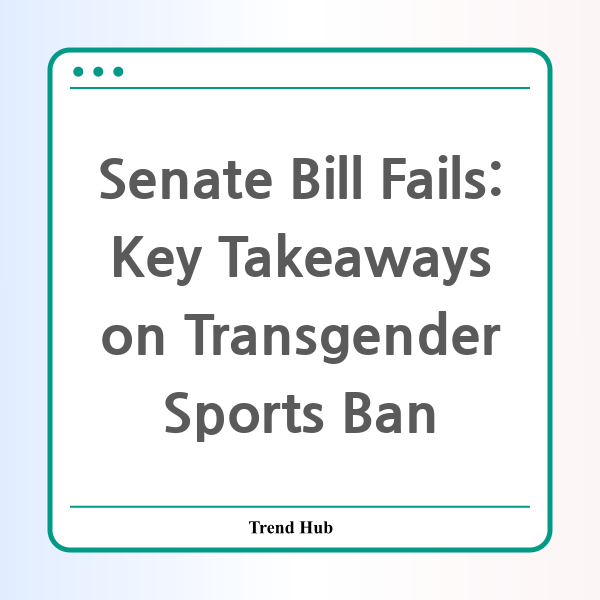* This website participates in the Amazon Affiliate Program and earns from qualifying purchases.

Is the future of women’s sports becoming a political battleground?
On Monday, Senate Democrats made headlines by successfully blocking a GOP-led bill that aimed to prevent transgender athletes from participating in women’s and girls’ sports at schools that receive federal funding. This decisive action underscores the ongoing clash over transgender rights and the growing significance of these issues in American politics.
The bill, which failed in a party-line vote of 51 to 45, sought to amend federal law, asserting that "sex shall be recognized based solely on a person's reproductive biology and genetics at birth.” Such a stipulation would shift the interpretation of Title IX, the landmark legislation that prohibits discrimination based on sex in educational programs and activities. The insistence on biological definitions raised concerns among LGBTQ+ advocates who argue this approach would excessively marginalize transgender individuals.
As we delve deeper into the implications of this bill's failure, it’s essential to understand the broader context. The GOP has significantly targeted transgender issues, labeling them as matters of fairness in sports—asserting that transgender women possess inherent physical advantages over cisgender women. Supporters of the bill argue that allowing transgender women to compete in women's categories could jeopardize opportunities for cisgender female athletes.
However, Democrats and LGBTQ+ advocates counter that such legislation fosters discrimination against transgender individuals and perpetuates the struggles faced by trans youth. Senator Brian Schatz from Hawaii criticized the Republican agenda, suggesting it attempts to fabricate a crisis to fuel division. Meanwhile, Senator Tammy Baldwin indicated that sports organizations should determine their policies rather than imposing federal mandates that may lead to unintended consequences.
While 53 Senate Republicans usually suggest a potential pathway for advanced legislation, the necessity of garnering 60 votes to overcome a filibuster poses significant challenges, particularly for issues polarizing within party lines. As the bill did not achieve sufficient support, it highlights the limits of the Republican majority in the Senate regarding contentious social issues.
The political landscape surrounding transgender rights shows no signs of easing. In states across the country, numerous GOP-led legislative efforts continue to push forward measures that restrict transgender participation in sports. For instance, the House had previously passed similar legislation, indicating a robust attempt to solidify these restrictions at the federal level.
Many believe that the Republican focus on transgender issues is a strategy employed to resonate with conservative voters, especially since a significant portion indicated that they feel support for transgender rights has "gone too far." The narrative of protecting women's sports has become a rallying point in recent elections, and figures like former President Donald Trump have taken a vested interest in advancing these policies.
On the other hand, opposition to such measures is gaining momentum. Activists and advocacy groups, including the Human Rights Campaign, emphasize that legislation aimed at banning transgender athletes sends a harmful message. Kelley Robinson, the organization's president, stated that every young person deserves access to positive experiences through sports, irrespective of their gender identity.
As discussions surrounding gender identity in athletics continue, the balance between maintaining fairness in sports and ensuring inclusivity is a pressing challenge. With states like Minnesota bracing for similar debates and potential legislative efforts, the national conversation on this topic remains heated.
In summary, the Senate's recent actions reflect deeper societal debates on gender and rights. Will future legislation strike a fair balance, or will it deepen divisions? This remains a pivotal question for America’s educational and sports landscapes.
* This website participates in the Amazon Affiliate Program and earns from qualifying purchases.